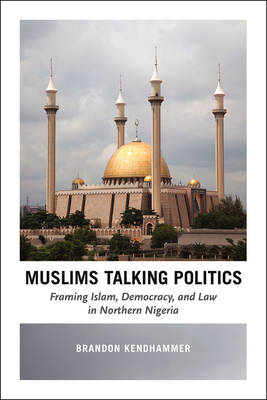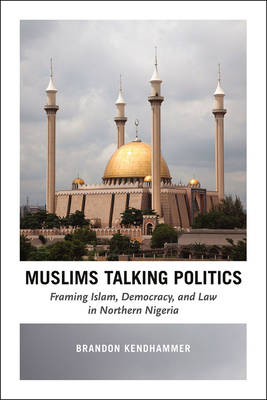
En raison d'une grêve chez bpost, votre commande pourrait être retardée. Vous avez besoin d’un livre rapidement ? Nos magasins vous accueillent à bras ouverts !
- Retrait gratuit dans votre magasin Club
- 7.000.000 titres dans notre catalogue
- Payer en toute sécurité
- Toujours un magasin près de chez vous
En raison de la grêve chez bpost, votre commande pourrait être retardée. Vous avez besoin d’un livre rapidement ? Nos magasins vous accueillent à bras ouverts !
- Retrait gratuit dans votre magasin Club
- 7.000.0000 titres dans notre catalogue
- Payer en toute sécurité
- Toujours un magasin près de chez vous
Muslims Talking Politics
Framing Islam, Democracy, and Law in Northern Nigeria
Brandon Kendhammer
Livre relié | Anglais
92,95 €
+ 185 points
Description
For generations Islamic and Western intellectuals and policymakers have debated Islam's compatibility with democratic government, usually with few solid conclusions. But where--Brandon Kendhammer asks in this book--have the voices of ordinary, working-class Muslims been in this conversation? Doesn't the fate of democracy rest in their hands? Visiting with community members in northern Nigeria, he tells the complex story of the stunning return of democracy to a country that has also embraced Shariah law and endured the radical religious terrorism of Boko Haram. Kendhammer argues that despite Nigeria's struggles with jihadist insurgency, its recent history is really one of tenuous and fragile reconciliation between mass democratic aspirations and concerted popular efforts to preserve Islamic values in government and law. Combining an innovative analysis of Nigeria's Islamic and political history with visits to the living rooms of working families, he sketches how this reconciliation has been constructed in the conversations, debates, and everyday experiences of Nigerian Muslims. In doing so, he uncovers valuable new lessons--ones rooted in the real politics of ordinary life--for how democracy might work alongside the legal recognition of Islamic values, a question that extends far beyond Nigeria and into the Muslim world at large.
Spécifications
Parties prenantes
- Auteur(s) :
- Editeur:
Contenu
- Nombre de pages :
- 312
- Langue:
- Anglais
Caractéristiques
- EAN:
- 9780226368986
- Date de parution :
- 22-06-16
- Format:
- Livre relié
- Format numérique:
- Genaaid
- Dimensions :
- 155 mm x 231 mm
- Poids :
- 544 g

Les avis
Nous publions uniquement les avis qui respectent les conditions requises. Consultez nos conditions pour les avis.






